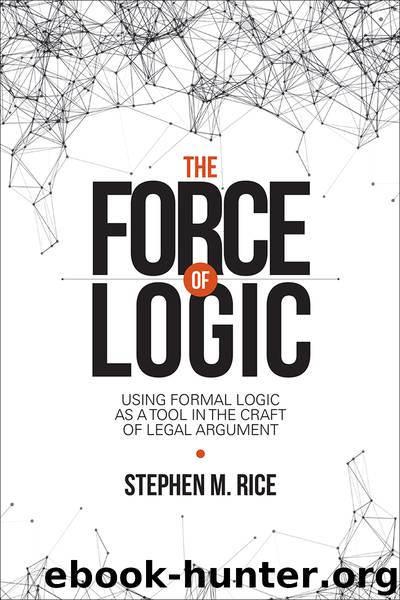The Force of Logic: Using Formal Logic as a Tool in the Craft of Legal Argument (NITA) by Stephen M. Rice

Author:Stephen M. Rice
Language: eng
Format: mobi
Publisher: Wolters Kluwer
Published: 2017-05-03T00:00:00+00:00
Some judges who have a special relationship with a litigant are [judges who are] required to recuse themselves.
Judge Davidson is a judge who has a special relationship with a litigant.
Therefore, Judge Davidson is a judge who is required to recuse herself.
Figure 30. An example of a legal argument taking the form of a categorical syllogism.
The middle term is undistributed in the major premise: “Some judges who have a special relationship with a litigant . . . .” The word “some” makes it clear that the major premise is not referring to all judges with a special relationships with a litigant. Instead, it only refers to a part of that class of judges. Formal logic is not concerned with the exact number of judges referred to here. Even if we substituted the word “most” or “nearly all” for the word “some,” the logical result would still be the same: the term is undistributed. A term is distributed or undistributed in formal logic. Accordingly, the middle term is undistributed in the major premise because the distribution of this term is express in the premise.
There is additional evidence of the middle term’s undistributed quality in the major premise. The major premise fits the pattern of a particular affirmative proposition described in Chapter Four. In a particular affirmative proposition, the subject term is always undistributed. Because “some judges who have a special relationship with a litigant” is the subject term of a particular affirmative proposition, it must be undistributed.11 However, the logical analysis should not end there; the rule says that the middle term only has to be distributed in one of the premises, not both of them. Accordingly, failure to distribute the middle term in the major premise is not fatal to the logical force of the argument unless the middle term is also undistributed in the minor premise.
However, analyzing the middle term’s appearance in the minor premise confirms that the middle term is not distributed there either. The minor premise, “Judge Davidson is a judge who has a special relationship with a litigant,” takes the form of a universal affirmative. As we learned in Chapter Four, a universal affirmative proposition includes a distributed subject and an undistributed predicate term. Here, the middle term is the predicate term. When the subject is distributed, we usually get language cues—words like “some” or “most”—that make that clear to us. This makes it easy to spot undistributed middle terms when they are subject terms. Conversely, undistributed predicates are not always so obvious. However, if we classify the form of the proposition, that classification provides just as reliable a method for assessing distribution as seeing the word “some” would. Of course, we also can see from the language of the proposition that there is only one Judge Davidson. That reveals the subject term, Judge Davidson, is distributed. But surely the proposition is not suggesting reference to the entirely of the class of judges who have special relationships with litigants. Judge Davidson is only one judge, and there are other judges who are not Judge Davidson.
Download
This site does not store any files on its server. We only index and link to content provided by other sites. Please contact the content providers to delete copyright contents if any and email us, we'll remove relevant links or contents immediately.
Objection! by Nancy Grace(1778)
Apeirogon by Colum McCann(1701)
Anatomy of Injustice by Raymond Bonner(1664)
That Every Man Be Armed by Stephen P. Halbrook(1578)
Civil Procedure (Aspen Casebooks) by Stephen C. Yeazell(1554)
The Vaccine Court by Rohde Wayne(1508)
Injustices by Ian Millhiser(1497)
Storytelling for Lawyers by Meyer Philip(1461)
A Practical Guide to International Arbitration in London by Hilary Heilbron(1434)
Restitution by Restitution(1424)
Coercing Virtue by Robert H. Bork(1357)
Broken Scales by Joel Cohen(1352)
Tangled Webs: How False Statements Are Undermining America: From Martha Stewart to Bernie Madoff by James B. Stewart(1338)
The Tools of Argument: How the Best Lawyers Think, Argue, and Win by Joel Trachtman(1316)
A Matter of Interpretation by Antonin Scalia(1310)
INDEFENSIBLE: One Lawyer's Journey Into the Inferno of American Justice by Feige David(1292)
American Tragedy by Lawrence Schiller & James Willwerth(1274)
A Religious Orgy in Tennessee by H.L. Mencken(1250)
Tangled Webs by James B. Stewart(1245)
